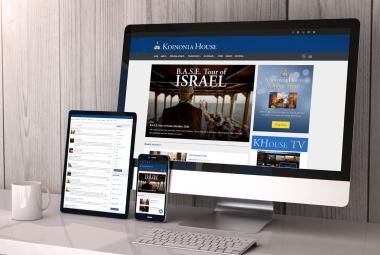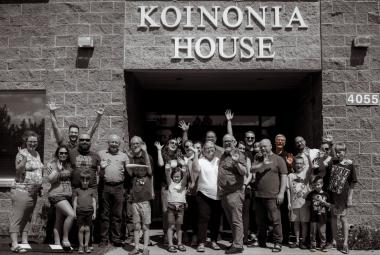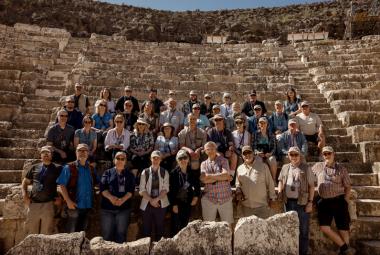In 2005, Koinonia House launched the Koinonia Institute fulfilling a dream of Chuck Missler to promote Biblical literacy among 21st century Christians. In the past, Koinonia Institute had 3 basic levels of membership, each with its own cost: Monthly KI Membership, Yearly KI Membership, and Lifetime KI Membership. Since its inception, Koinonia Institute has greatly grown in membership and available study courses.
In honor of his memory and in keeping with his dream, we have made some exciting new changes that we feel will expand the availability of the teaching ministry of Koinonia House through the facilities of Koinonia Institute.
Now you can join Koinonia Institute for FREE!
How do you join? Here is the simple step-by-step procedure:
- Using a web browser, go to https://koinoniainstitute.org
- On the opening page, click the button “Become a Member.”
- On the pricing page, click the button “Start a Free Membership.”
- On the signup page, fill out the required information and then click “Continue.”
- Please make a note of your Username. This is your login username. Please remember it, you will need it to log in.
- Provide a password that meets the requirements shown on the screen and then click “Continue”
- Be sure to click the “Submit” button to open the account.
As a Basic KI Member, you receive:
- A lifetime access to Koinonia Institute.
- Unlimited access to all of the online courses available through Koinonia Institute.
- 20% members discount on all material available in the Koinonia House online store at store.khouse.org.1
- Access to all free content and articles associated with Koinonia Institute.
A KHouse TV subscription can be purchased (renewable monthly or annually), you receive:
- You can stream Koinonia House on-demand content online. That’s more than 1,000 hours of instruction available at the click of a button. Go to KHouse.tv for more information.
If you sign up now as a new Basic KI Member, you will have access to all of the Basic KI member privileges.
Koinonia Institute - Mission Statement, Philosophy & Approach
Koinonia Institute is dedicated to training and equipping the serious Christian for ministry in today’s world. For several decades, the ministry of Koinonia House has been to create, develop, and distribute educational materials for those who take the Bible seriously as the inerrant Word of God. As an affiliated ministry, the Koinonia Institute is focused on three supporting areas:
- To provide instructional programs to facilitate serious study of the Bible among thinking Christians;
- To encourage and facilitate both individual and small group weekly study programs for personal growth; and
- To develop an international cadre of believers who answer God’s unique calling on their lives, especially as they see prophetic trends unfold and discern what is really happening in the world.
We believe in a heuristic approach in our teaching methods. Our goal is to emphasize techniques which establish “self-feeders”—students of the Word of God who are equipped to discover for themselves—within the pale of the hermeneutics of the inerrancy of the Word. We also favor establishing not only effective communication techniques but also skills in discernment within our contemporary environment.
The Institute is committed to accomplishing these goals through a program of lifelong learning—exploiting the Internet in order to achieve the “training and equipping” in our mission statement. Koinonia Institute is formed around three tracks — The Berean, The Issachar, and The Koinonos. For information about each track.2
The Koinonia Institute - Course Structure
The Koinonia Institute is designed around a Threefold Structure: “a threefold cord is not quickly broken.”3
The programs at the Koinonia Institute are organized around three “tracks”, avenues of study, which are concurrent paths of achievement:
- The Berean Track
- The Issachar Track
- The Koinonos Track
It is the objective of the Institute to encourage the student, through a balanced program of simultaneous progress, along each of these tracks. (Think of them as three legs on a stool: balance is an essential requisite for effectiveness.) The three tracks include a wide variety of classes to permit a tailored curriculum to match the specific gifting of each individual student.
With a large selection of courses, students can get right into studying the Word of God based on in-depth Bible commentaries, exploring topical studies related to a wide variety of ministry opportunities as well as interacting with the online KI community.
As various levels are achieved in each of the three tracks, a series of Distinguished Achievement Awards are available. See the current Student Handbook posted on our website for more details.4
The Berean Track
The Berean Track is the primary backbone of the Institute, motivated by the diligence of the Bereans:
These were more noble than those in Thessalonica, in that they received the word with all readiness of mind, yet searched the Scriptures daily, to prove whether those things were so.
Acts 17:11
The program begins with a strategic overview of the entire Bible, with an emphasis on its integrity of design, its extra-terrestrial origin, and its inerrancy in the original autographs. The Silver and Gold courses concentrate on studying specific books of the Bible, verse-by-verse, with in-depth expositional commentaries based on a commitment to the inerrancy of the Word of God. Grading guidelines for the Berean Courses can be found in the KI Grading Guide5 and from a link in the classrooms.
The Issachar Track
The Issachar Track is motivated by the diligence of the Sons of Issachar:
And of the Sons of Issachar, which were men that had understanding of the times, to know what Israel ought to do;
1 Chronicles 12:32
The Institute’s course of study is aimed at encouraging an in-depth understanding of God’s plan of redemption and an awareness of the times—and challenges to ministry—we currently face. The Sons of Issachar understood the times, knew what to do, and did it. In the same way, the serious study of the Word of God should precipitate positive changes in the life of a Christian, based on understanding, discernment, and action.
As we draw closer to the return of our Lord and Savior, it is important to remember Matthew 9:36-38 and Luke 10:1-2 when Jesus told His disciples to Look at the harvest and ask “the Lord of the harvest to send forth laborers into his harvest.” He was directing the disciple’s attention to the people around them with eternal souls who were lost and like sheep without a shepherd. But He did not just tell them to “look” and then go merrily on their way. He was directing their attention to the needs of the people, to see the opportunities for ministry all around them, and then ask the Lord how He wants them to serve in the great harvest.
The combination of new Issachar courses and the corresponding new Koinonos courses are designed to work together to help our members focus their attention on finding the ministry to which God is calling and preparing them to engage.
To this end, the Institute endeavors to provide courses aimed at encouraging an in-depth understanding of God’s plan of redemption and an awareness of the times and challenges we currently face.
The study of prophetic Scriptures gives us the right perspective of the world, but we must apply that understanding to our daily lives.
The Issachar Track deals with prophecy, discernment, and realizing what kinds of service God intends for us.
Instead of traditional testing, nearly all the Issachar and Koinonos classes use a self-assessment tool known as KWL. This is a written assessment identifying what you know (K), what you want to know (W), and what you have learned (L). This must be submitted to receive credit for the class, but it is not graded or seen by other students in the class. This approach allows you to reflect and record your personal insights for each course, as the Lord leads. It also allows you to give special attention when certain parts of the subject are especially important for you.
The Koinonos Track
The Koinonos Track is taken from the Greek word for a partner or participant; it also implies a fiduciary—one who puts his partner’s interests ahead of his own. The Koinonos Track is intended to emphasize being a doer of the Word, not a hearer only.
The Koinonos Track takes its imperative from the Third Commandment:
Thou shalt not take the name of the LORD thy God in vain; for the LORD will not hold him guiltless that taketh His name in vain.
Exodus 20:7
It is our view that this has little to do with vocabulary (as is often supposed), but refers to ambassadorship. If we are to take the name of the King, we need to be prepared to represent Him faithfully and competently, in actions, not just in words alone. The Koinonos Track focuses on discipleship, servanthood, and ambassadorship. It also strongly encourages participation in and leadership of a small study group as one of the most effective means of personal growth.
In the Koinonos Track, you put what has been learned in the Berean and Issachar tracks into action, while diligently seeking to know God better.
All members are required to keep a “Ministry Journal” during their studies with the Institute. This journal is used to record how God is leading you in service and ambassadorship. Your Ministry Journal should be updated often as you witness the hand of God directing your path. During your upper level of studies, your Journal should become an ongoing record of how God is using you to accomplish the ministry for which He has been preparing you. The Koinonos Track is the culmination of His leading; it’s where faith produces works.
Distinguished Achievement Awards
As an incentive to maintain a balanced program among all three tracks, a series of Medallion Awards has been established. The Medallion design is centered around the passage in 1 Corinthians 13:12 (in Greek), and Luke’s admonition to diligence in Acts 17:11 (which has been a trademark of Koinonia House for several decades). This is all embedded on the background of the symbol for Israel, the Shield of David, and the Sh’ma, Deuteronomy 6:4-5 (in Hebrew), the Great Commandment.
We must always remember that these milestones are intended only to be encouraging markers on our pathway to the “golden crowns” to be placed on that glassy sea and are not an end in themselves. We are in a “boot camp” for heaven, and just as a track contestant in training never confuses the stopwatch in a trial run with meritorious performance in a main event, we too must never confuse the “odometer” with the road map!
The Pathway to Bronze
In ancient Israel, the first things encountered when entering the Tabernacle were the Brazen Altar and the Brazen Laver (“Molten Sea”). The word translated “brass” in the King James Version would be more correctly rendered bronze, since the alloy used was copper and tin
(Ex 27:4).
Levitically, bronze was the metal that could sustain fire; it represented God’s judgment. The brazen serpent on a pole represented the Cross: Jesus, “made sin” and judged in our stead. (Num 21; Jn 3:14; 2 Cor 5:21). Two bronze pillars encountered in front of Solomon’s Temple were named Boaz, “in His Strength,” and Jachin, “in His Counsel”
(1 Kgs 7:21; 2 Chr 3:17).
Our first level of achievement in the Institute is the Bronze Medallion, memorializing our commitment to Christ: to rely on His strength, and to remain in His counsel. When the Bronze requirements have been met in all three tracks, a Bronze Medallion certification will be awarded. However, our tokens, trinkets, and activities must never take our eyes off of Him, or they become “Nehushtan”: a thing of brass! (2 Kgs 18:4).
The Pathway to Silver
The trying of men’s hearts was compared to the refining of silver (Ps 66:10; Isa 48:10). YHWH’s words were as pure as silver refined seven times (Ps 12:6). The gaining of understanding is better than the gaining of silver (Prov 3:14; compare 8:19; 10:20; 16:16; 22:1; 25:11). Levitically, silver was the symbol of blood. The Tabernacle rested on silver sockets (Ex 38:25-27). The redemption shekels were of silver
(1 Sam 9:8). Judas even attempted to return the thirty pieces of silver and cried, “I have betrayed innocent blood!” (Mt 27:4).
Our silver medallions are to remind us that nothing avails for us but the blood of our Savior. No achievement which we might undertake, no matter how extensive or weighty, can add to what He has already completed on our behalf.
Here we attempt to train the serious Christians within the Membership Commonwealth for ministry, as God may lead them. Again, the emphasis in the pathway to Silver is to balance the efforts in each of the three avenues of study. When the Silver requirements have been met in all three tracks, a Silver Medallion certification will be awarded.
The Pathway to Gold
Gold reminds us of Jesus’ Kingship. The gifts at His birth were myrrh, frankincense, and gold, indicating the offices of Prophet, Priest, and King. Our goal is simply to be the King’s Ambassador and to represent Him faithfully. Everything external to the Tabernacle (and the Temple) was bronze: the Altar, the Laver, etc. However, everything on the inside was gold.
When the requirements have been met in all three tracks, the Gold Medallion certification will be awarded.
Our Gold Medallion is not a “final” goal: only an intermediate “midcourse” reminder that our ambition is to earn that ultimate Crown of Gold, which we will then cast upon the glassy sea (Rev 4:6, 5:10).
Notes:
2 See the Koinonia Institute Handbook - https://ki.studycenter.com/resources/KI_Handbook.pdf
3 Ecclesiastes 4:12
4 See the Koinonia Institute Handbook - https://ki.studycenter.com/resources/KI_Handbook.pdf






